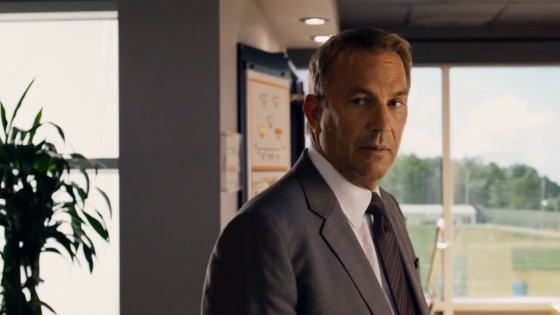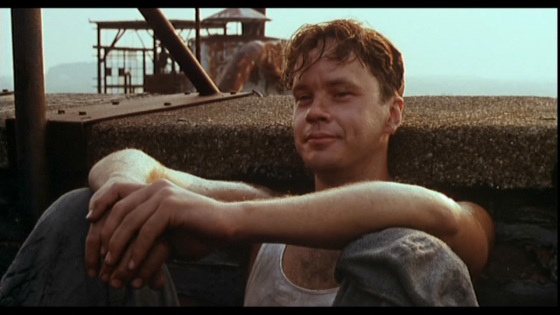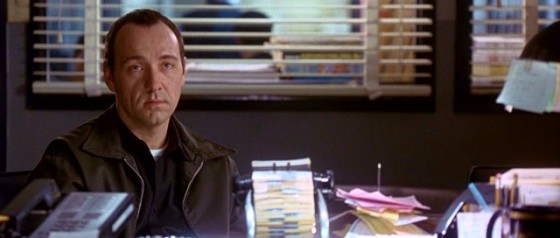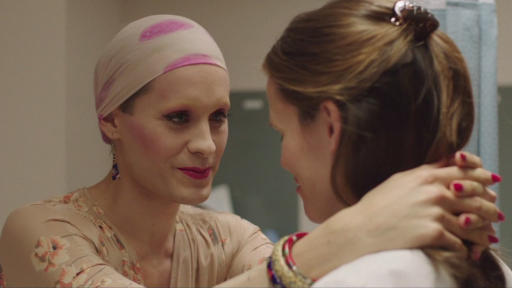Obama is gonna get verbally fricasseed by Jeremy Scahill if “Dirty Wars” wins the Oscar for Best Documentary.
But it won’t win. “The Act of Killing” will. Because “The Act of Killing” is a portrait of humanity’s badness that crawls inside your mind like an alien spider, laying eggs there that take forever to hatch.

P”””’-(
This is the second battle in The Flip Side’s Oscars Combat series. Previously, we hashed out who should win for Best Supporting Actress. Click here for that. It’s short. Next will be Leto vs. Fassbender.
P”””’-(
There’s an old ex-reporter in “The Act of Killing,” whose blatant B.S. gets smacked down. As I watched it I wondered what life will be like when lazy, incurious hacks like Chuck Todd (NBC News White House correspondent) and his ubiquitous ilk are one day pretending they didn’t willfully ignore the most important story of Obama’s terms.
Quick background. “The Act of Killing” takes place in Indonesia, where the military overthrew the government in 1965 and began killing anyone it labeled “communist.” At least a million people died. The film’s director, Joshua Oppenheimer, asks some of the most prolific killers from that time—Anwar Congo murdered roughly 1,000 people, many by strangling with wire—to reenact the killings for their own movie. The result is surreal and disturbing. Anwar has a physical on-screen reckoning at the end of the film. I still can’t get it out of my head.
The part I want to talk about here, though, involves a man who was a reporter during the massacres. Between takes where they recreate an interrogation scene, he talks with one of the killers while Oppenheimer’s camera rolls.
“I declare I never saw anything,” the old ex-reporter says. “Now, seeing your reenactment, I realize you were so smooth that even me, a journalist with such sharp senses, I never knew!”
“I’m surprised,” the former mass killer says, his eyes almost rolling. “Because we didn’t hide what we were doing. If you didn’t know, I’d be shocked.”
“I didn’t.”
“We were in the same office and we didn’t hide it.”
“I never knew.” There are a few awkward beats and the old ex-reporter continues: “You were so smooth, and I rarely went up to your office.”
Then Oppenheimer speaks from behind the camera, which he doesn’t do more than a few times in this film, but even he can’t take it. “Your publisher directed the torture,” Oppenheimer says.
“No!” the ex-reporter says.
Oppenheimer: “He said so himself.”
“That’s not true!”
“He and the other leaders decided who was killed,” Oppenheimer says.
Then the former killer chimes back in: “Look, I’m not calling you a liar, but logically. . .” He starts talking to Oppenheimer and the camera. “But this man, a journalist distancing himself from these things . . . that’s predictable. But logically, we didn’t hide. How could he not know? Even the neighbors knew! Hundreds were killed. It was an open secret.”
That is predictable.
Now let’s jump to “Dirty Wars.” Jeremy Scahill is the main character in the movie, an investigative reporter followed by cameras as he digs into the killing of innocent Middle Easterners by US bombs and paramilitary commandos.
Scahill goes first to Gardez, Afghanistan. An old man with dark, angry eyes tells him about a night raid. “My son, my other son, my daughter-in-law, and my granddaughter, all killed on a single day by American soldiers. In the attack, two women who were pregnant were killed.”
“I didn’t want to live anymore,” says another man — eyes, likewise, dark and colorless — who was taken prisoner by the US and whose wife, sister and niece were killed. “I wanted to wear a suicide jacket and blow myself up among the Americans, but my brother and my father wouldn’t let me.”
The Americans told the survivors they had intel that 50 Taliban were hiding out there. This was beyond untrue — the slain were pro-American, and some had even fought with the Americans against the Taliban.
The movie starts with that raid. Scahill wants to figure out why the people in Gardez were attacked. His investigation spirals into the stratosphere when he looks into other attacks on innocent villages. As he’s digging, there are shots fired within earshot. Back home in America, he is threatened by government officials who don’t like his stories.
The film flashes back to clips of Scahill when he was on the news-show circuit promoting his book “Blackwater,” about private contractors who got into shootouts in war zones. In one scene, Scahill goes on Bill Maher’s HBO show and faces down Chuck Todd, the aforementioned NBC White House correspondent.
“Journalists have done nothing to hold the White House accountable now, Chuck, or under Bush.”
Then Jay Leno, who was also a panelist that episode, interrupts to ask Scahill “Why are you still alive? Are you paranoid? I’m serious.”
Todd and almost everyone on TV and the internet who cover Obama are in Washington DC daily, and the stories they deem most important always involve what Democrats and Republicans say about each other.

complicit and enabling
Are the latest complaints about Obamacare bigger than this: One of the poorest tribes in Southern Yemen was bombed by American forces who claimed there was an Al Qaeda training base there. There was no base. Forty-six people, many women and children, died. A local Yemeni reporter investigating the bombing was locked in prison. When he appeared in court, his teeth had been pulled and he had scars on his chest. (Also, his lawyer’s offices were attacked.) When public outcry mounted over the reporter’s imprisonment, the president of Yemen agreed to set him free. Then he got a phone call from Obama, directly. Obama convinced the president to keep the reporter imprisoned. White House records, available online, prove that Obama called Yemen to keep the reporter locked up.
Chuck Todd will one day deny he ever knew the president was bombing children and keeping innocent reporters locked in jail to be abused.
Or killing a 16-year-old American teenager who went to look for his father, the American anti-American Anwar Al-Awlaki. Obama drone-bombed Al-Awlaki, and was happy to brag about that one. He did not ever explain his decision to subsequently drone bomb Al-Awlaki’s son. Does the son have to die so he can’t avenge the father, like “Godfather II”?
If the president of the United States killed an innocent American teenager because he feared vendetta, that’s a big story. Except it isn’t. Debt ceilings and state dinners are, if you’re the NBC White House correspondent.
“Even me, a journalist with such sharp senses, I never knew!”
Scahill speaks with Al-Awlaki’s father before the drone bombings, when he was trying to get the US Justice Department to explain how it could legally justify killing Al-Awlaki. Then he speaks to the father again, after his son and grandson are dead. His eyes are completely different. They’ve gone dark, like the survivors in Gardez.
P”””’-(
“Dirty Wars” is more important than “The Act of Killing.” It’s a work of astonishing journalism, investigating one of the most important stories in the world—the killing and imprisonment of innocents, ordered by the president and covered up by Congress and mainstream American media.
“The Act of Killing,” though, is psychological superart. At the beginning of the film, Anwar Congo is literally dancing the cha cha on a site where he personally executed hundreds of people he knows did not deserve to die. Over the course of the movie we watch him try to recreate with costumes and makeup the ghost that haunts him when he attempts to sleep each night. He describes the one victim he can’t stop picturing (“All I could think about was why didn’t I close his eyes?”). We watch him put on zombie makeup and gangster clothes and act out the end of his victims’ lives, and almost totally break down. We watch him dry heave, in a futile attempt to expel demons.
I kept putting off writing this blog. Both these films really messed with me. In “Dirty Wars” you see a dead baby in the aftermath of the bombing in Yemen. Its little body gets held up for the camera by a furious family member. In “The Act of Killing,” confessed mass murderers brag about how gangster they are (“gangster” means “free man,” they explain over and over) and describe how they switched from beheadings to wire strangulations because they tired of smelling and cleaning so much blood. An elaborate dance number includes choreographed belly dancing, Anwar in a black robe, another gangster in skin-tight neon drag, and actors as massacre victims thanking their killers.
I saw the nutzo dance number at the beginning and end of “The Act of Killing” as a representation of just how insane it is to try and justify killing innocent people.
I wish Superman hadn’t killed Zod at the end of “Man of Steel.” The ending to the last (fantastic) episode of “Sherlock” really bothers me now.
I hope there’s a tie for Best Documentary. Can that happen? I hope there’s a tie, but Scahill gets to talk more than Oppenheimer at the podium.



















